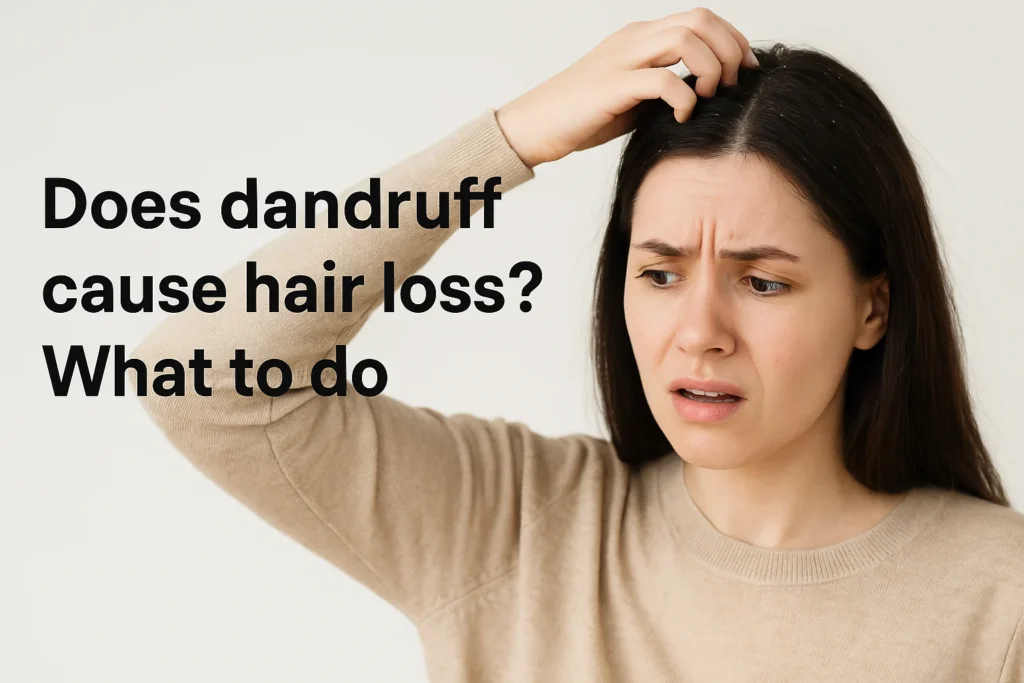Dandruff is more than just a little flaking on your scalp—it can be itchy, embarrassing, and in some cases, even contribute to hair loss. If you’re wondering, “Does dandruff cause hair loss?”, you’re not alone. Many women dealing with excessive shedding also notice visible flakes on their scalp and shoulders. So, how exactly are these two problems linked? And does anti-dandruff shampoo cause hair loss, too?
In this article from Lotus Femcare, we’ll explore the real science behind dandruff-related hair loss, what triggers it, and how you can protect your scalp and strands effectively.
Does Dandruff Cause Hair Loss?
Yes, dandruff can contribute to hair loss, but indirectly. Dandruff itself doesn’t damage the hair follicles. Instead, it creates an environment that leads to scalp inflammation, intense itching, and frequent scratching, which can weaken the hair shaft and cause strands to fall out prematurely.
When your scalp is unhealthy and inflamed, it becomes difficult for hair to grow optimally. Frequent irritation and the accumulation of flakes can disrupt the natural hair growth process.
Why Does Dandruff Cause Hair Loss?
Let’s explore the different ways dandruff can contribute to increased hair shedding:
- Scalp Inflammation: Flakes from dandruff are often accompanied by redness and irritation. This inflammation weakens the hair roots.
- Persistent scalp itching often leads to excessive scratching, which may injure the follicles and cause strands to fall out or break.
- Excess oil on the scalp, often seen with oily dandruff, can clog hair follicles and hinder the healthy growth of new hair.
- Fungal Infection: A yeast-like fungus called Malassezia is often responsible for dandruff. It feeds on scalp oils and triggers immune reactions, which can further affect follicle health.
What Causes Dandruff & Hair Loss Together?
Sometimes, the causes of dandruff and hair loss overlap. Here are a few common triggers:
| Cause | Impact on Scalp | Impact on Hair |
| Fungal Infection (Malassezia) | Irritates scalp, creates flakes | Inflammation leads to shedding |
| Seborrheic Dermatitis | Chronic dandruff, greasy patches | Damages follicles over time |
| Dry Scalp | Flaking without oil | Hair becomes brittle and weak |
| Product Buildup | Traps dirt and oil | Follicles get clogged |
| Hormonal Imbalances | Excess oil, scalp sensitivity | Causes both dandruff and hair thinning |
| Stress | Aggravates dandruff | Shifts hair into the shedding phase |
Does Anti-Dandruff Shampoo Cause Hair Loss?
Here’s the truth: Anti-dandruff shampoos don’t directly cause hair loss, but using the wrong formula can irritate your scalp or dry out your hair.
Some medicated shampoos contain strong ingredients like:
- Ketoconazole
- Zinc Pyrithione
- Coal Tar
- Salicylic Acid
- Selenium Sulfide
These ingredients are effective against dandruff but may be harsh if overused, especially for women with sensitive scalps or dry hair types. Be sure to use the product as instructed and pick a formula that matches your specific hair type and scalp needs.
Tip: Look for shampoos labeled gentle, sulfate-free, and moisturizing if your hair is already dry or brittle.
How to Prevent Hair Loss from Dandruff
To prevent hair loss caused by dandruff, focus on treating your scalp with care:
Follow These Tips:
- Use Medicated Shampoos: Choose one with Ketoconazole or Zinc Pyrithione—but not daily unless advised.
- Moisturize Your Scalp: Use scalp oils like tea tree oil, jojoba oil, or aloe vera.
- Avoid Heat Styling: Give your scalp time to heal.
- Stay Hydrated & Eat Healthy: Omega-3s, biotin, and protein-rich foods support hair and scalp health.
- Switch Hair Products Carefully: Avoid products with alcohol, sulfates, or synthetic fragrances.
- Don’t Scratch: Even if it’s itchy! Scratching causes microtears and weakens follicles.
- Exfoliate Your Scalp Weekly: Use a gentle scrub or brush to remove dead skin.
How to Treat Both Dandruff & Hair Loss Simultaneously
Combine these approaches for the best results:
1. Scalp-Focused Routine:
- Start with a dandruff-specific shampoo twice a week.
- Apply a soothing scalp serum after washing. Hair Strengthening Products.
2. Hair Strengthening Products:
- Choose a nourishing conditioner that contains strengthening ingredients like keratin, panthenol, or biotin.
- Treat your hair to a deep-conditioning mask weekly for added moisture and repair.
3. Medical Consultation:
- If shedding continues, consult a dermatologist.
- Conditions like psoriasis or seborrheic dermatitis may need prescription treatment
Best Ingredients to Look For
| Ingredient | Benefits |
| Tea Tree Oil | Antifungal, soothes inflammation |
| Ketoconazole | Fights fungal dandruff |
| Salicylic Acid | Removes flakes and excess oil |
| Zinc Pyrithione | Reduces yeast growth |
| Niacinamide | Boosts scalp circulation |
| Biotin | Strengthens hair strands |
Ingredients to Avoid If You Have Hair Fall + Dandruff
- Sulfates (SLS, SLES)
- Parabens
- Heavy Silicones
- Alcohol (denatured)
- Synthetic Fragrance
These may strip your scalp, worsen dryness, or cause buildup that interferes with hair growth.
FAQs: Dandruff & Hair Loss
Q1. Does dandruff cause hair loss?
No, dandruff-related hair loss is usually temporary and reversible with the right treatment.
Q2. Can anti-dandruff shampoo cause hair fall?
Some anti-dandruff shampoos can dry out hair or irritate the scalp, especially if overused. Choose gentle, scalp-soothing formulas.
Q3. When can you expect to notice visible results?
You may notice less flaking within 2–4 weeks of regular use of the right products. Hair regrowth takes 2–3 months after scalp health improves.
Q4. Is dandruff worse in winter?
Yes. Dry air, hot showers, and indoor heating make the scalp dry and flaky in winter, potentially triggering more hair fall.
Q5. Can natural remedies work?
Yes, mild cases of dandruff respond well to tea tree oil, apple cider vinegar, and aloe vera. But fungal types may need medicated solutions.
Final Thoughts
So, does dandruff cause hair loss? Yes, it can—but it’s not permanent if treated early. Dandruff creates an unhealthy scalp environment that leads to itchiness, inflammation, and shedding. With the right anti-dandruff shampoo, soothing hair care, and smart lifestyle habits, you can tackle both dandruff and hair loss effectively.
At Lotus Femcare, we’re here to help you regain confidence in your hair and scalp. Whether you’re dealing with mild flakes or severe shedding, consistent care and the right choices can make a huge difference.



